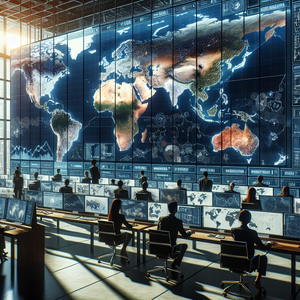
15 Careers in Geopolitics: Navigating Risks, Trade, and Global Challenges
In today’s interconnected world, geopolitics plays a pivotal role in shaping industries, economies, and societies. From trade disruptions and sanctions to cybersecurity threats and energy crises, global challenges have never been more pronounced. These complex dynamics demand skilled professionals who can anticipate risks, develop strategies, and adapt to rapidly evolving scenarios. Recent events such as the U.S.-China trade war, the Russia-Ukraine conflict, and Brexit have underscored the far-reaching impact of geopolitical tensions. Businesses are restructuring supply chains, governments are reassessing policies, and international organizations are prioritizing risk mitigation like never before. This shifting landscape has created an urgent demand for expertise at the intersection of international relations, economics, and strategic planning. This article highlights 15 careers that are essential to navigating geopolitical complexities. Whether you’re a recent graduate exploring career options or a seasoned professional seeking a new direction, these roles offer exciting opportunities to contribute to global stability and resilience.
Job Summaries:
Geopolitical Risk Analyst:
- Geopolitical Risk Analysts assess the impact of global political developments—such as elections, armed conflicts, and policy changes—on industries, trade, and investments.
- They provide guidance to businesses on adapting to risks like escalating tariffs or shifting supply chains.
- Required skills include critical thinking, data analysis, and international relations expertise, with qualifications in political science, economics, or related fields.
International Trade Policy Specialist:
- These specialists craft trade agreements, analyze global trade regulations, and help businesses navigate trade challenges.
- They are essential during events like Brexit, providing expertise in trade frameworks, negotiation, and legal knowledge.
- A background in international trade, economics, or law is crucial, often paired with a master’s degree.
Supply Chain Resilience Manager:
- Supply Chain Resilience Managers develop strategies to minimize risks in global supply chains affected by geopolitical disruptions.
- They focus on sourcing alternatives and diversifying logistics, especially during crises like the COVID-19 pandemic.
- Expertise in logistics, risk management, and certifications like APICS or CSCP are key.
Global Economic Policy Advisor:
- Global Economic Policy Advisors design policies to reduce economic instability during geopolitical crises.
- They analyze economic models and recommend strategies, such as energy diversification during the Russia-Ukraine conflict.
- Advanced degrees in economics, public policy, or international relations are common qualifications.
Corporate Geopolitical Strategist:
- These strategists help multinational companies navigate global risks and seize opportunities in politically complex markets.
- They provide insights on expanding into regions like Southeast Asia amid U.S.-China tensions.
- A background in business, risk management, or political science, along with international experience, is valuable.
Conflict Resolution Specialist:
- Conflict Resolution Specialists mediate disputes influenced by geopolitical issues, fostering dialogue and understanding.
- They are instrumental in resolving trade disagreements during WTO negotiations.
- Skills in negotiation, cultural awareness, and communication are essential.
- Qualifications in international law or diplomacy are required.
International Trade Compliance Officer:
- These officers ensure businesses comply with international trade laws, especially during sanctions or export controls.
- They guide companies through restrictions like those on Russia, helping avoid penalties.
- Knowledge of trade law, export controls, and degrees in law or international trade are key qualifications.
Political Risk Insurance Underwriter:
- Political Risk Insurance Underwriters design policies to protect businesses from financial losses due to geopolitical events.
- They provide insurance for operations in politically unstable regions.
- Requiring skills in risk analysis and finance.
- Qualifications in finance, insurance, or international business are needed.
Geostrategy Consultant:
- Geostrategy Consultants help organizations leverage geopolitical developments to gain a competitive edge.
- They advise on adapting to initiatives like China's Belt and Road.
- Required skills include scenario planning and strategic thinking, with degrees in business or international relations.
Cyber-Geopolitical Analyst:
- Cyber-Geopolitical Analysts assess geopolitical motivations behind cyber threats and strengthen organizational defenses.
- They analyze ransomware attacks linked to international conflicts.
- Requiring cybersecurity expertise, risk assessment skills, and degrees in cybersecurity or political science.
Geopolitical forces are reshaping industries and creating both challenges and opportunities for professionals in this dynamic field. From mitigating trade disruptions to advising on energy policy, the careers highlighted here are at the forefront of addressing global risks. By pursuing these roles, you can contribute to building resilient economies, fostering international cooperation, and navigating the complexities of an increasingly interconnected—and uncertain—world. Whether you’re drawn to shaping policy, analyzing risks, or driving global strategy, these careers offer a chance to make a meaningful impact in the face of geopolitical challenges. With the right skills, qualifications, and a keen understanding of global affairs, you’ll be well-positioned to thrive in this ever-evolving landscape.
Explore More Jobs

